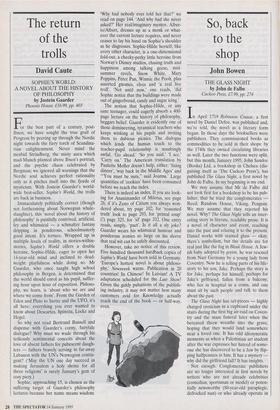The return of the trolls
David Caute
SOPHIE'S WORLD: A NOVEL ABOUT THE HISTORY OF PHILOSOPHY by Jostein Gaarder Phoenix House, £16.99, pp. 403 Er the best part of a century, post- Ibsen, we have sought the true grail of Progress by peering up through the Nordic night towards the fiery torch of Scandina- vian enlightenment. Never mind the morbid Strindberg, the misty aura which mad-Munch planted above Ibsen's portrait, and the psychic chaos celebrated by Bergman; we ignored all warnings that the Nordic soul achieves perfect rationality only as it pitches itself into the fjorde of mysticism. With Jostein Gaarder's world- wide best-seller, Sophie's World, the trolls are back in business.
Immaculately politically correct (though not forthcoming about Norwegian whale- slaughter), this 'novel about the history of philosophy' is painfully contrived, artificial, fey and whimsical — a schmaltzy fantasy dripping in ponderous, schoolmasterly good intent. It's torture. Wrapped up in multiple levels of reality, in stories-within- stories, Sophie's World offers a double heroine, Sophie-Hilde, eager to open her 14-year-old mind and inclined to dead- weight playfulness while doing so. Mr Gaarder, who once taught high school philosophy in Bergen, is determined that the world should enrol as his pupil, suffer- ing hour upon hour of exposition. Philoso- phy, we learn, is 'about who we are and where we come from'. From the Garden of Eden and Plato to Sartre and the UFO, it's all here: everything you ever wanted to know about Descartes, Spinoza, Locke and Hegel.
So why not read Bertrand Russell and dispense with Gaarder's. corny, fairytale dialogue? Why must we wade through his tediously sentimental conceits about the love of absent fathers for pubescent daugh- ters — fathers bravely serving in far-away Lebanon with the UN's Norwegian contin- gent? (Way the UN one day succeed in making Jerusalem a holy shrine for all three religions' is surely January's gem of cosy piety.) Sophie, approaching 15, is chosen as the suffering target of Gaarder's philosophy lectures because her name means wisdom. `Why had nobody ever told her that?' we read on page 144. 'And why had she never asked?' Her real/imaginary mentor, Alber- to/Albert, dresses up as a monk or what- ever the current lecture requires, and never ceases to lay his hand on Sophie's shoulder as he disgresses. Sophie-Hilde herself, like every other character, is a one-dimensional fold-out, a cheeky-perky little heroine from Norway's Disney studios, chasing truth and happiness among talking geese, mid- summer revels, Snow White, Mary Poppins, Peter Pan, Winnie the Pooh, plus assorted gnomes, elves and 'a real live troll'. 'Not until now,' one reads, 'did Sophie notice that the buildings were made out of gingerbread, candy and sugar icing.'
The notion that Sophie-Hilde, or any sane teenager, could eagerly absorb a 400- page lecture on the history of philosophy, beggars belief. Gaarder is evidently one of those domineering, tyrannical teachers who keeps winking at his pupils and inviting them to dubious picnics. The dialogue which lends the human touch to the teacher-pupil relationship is numbingly awful. 'Go ahead.' So you said.' I see.' `Carry on.' The American translation by Paulette Moller doesn't help, either: 'fixing dinner', 'way back in the Middle Ages' and "'You must be nuts," said Joanne.' Large quantities of 'cookies' have been consumed before we reach the index.
There is indeed an index. If you are look- ing for Anaximander of Miletus, see page 26; if it's Zeno of Citium you always won- dered about, try page 102; for 'reasoned truth' look to page 293, for 'primal soup' (!) page 325, for 'id' page 332. One entry reads, simply, 'pact'. Is it all a sly joke? Gaarder wears his whimsical humour and ponderous ironies so large on his sleeve that real wit can be safely discounted.
However, take no notice of this review. Five hundred thousand hardback copies of Sophie's World have been sold in Germany. `Europe's hottest novel is about philoso- phy,' Newsweek warns. Publication in 20 countries! In Chinese! In Latvian! A TV adaptation scheduled for the Late Show! Given the giddy pulsations of the publish- ing industry, it may not matter how many customers avid for Knowledge actually reach the end of the book — or half-way, even.









































 Previous page
Previous page